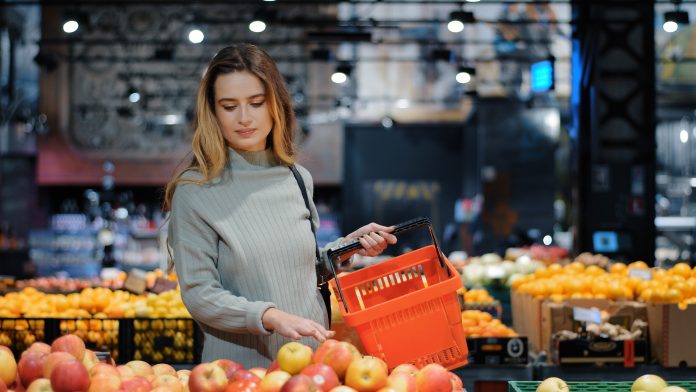Richard Werren shares findings from a new global consumer study, identifying trust as the make-or-break factor in circular food systems
The circular economy continues to gain momentum, but in the food sector, consumer inertia remains a barrier. Despite growing awareness of environmental impact, most shoppers still shy away from circular food products, such as items in recycled packaging or irregularly shaped produce, because of concerns about quality, safety, and reliability.
These insights are at the heart of The Tipping Point: Building Trust in the Circular Economy, a new global study from BSI developed in partnership with the University of Cambridge’s Institute for Sustainability Leadership (CISL).
The trust gap in circular food products
BSI’s research surveyed over 8,000 consumers across eight countries, revealing a striking disconnect between environmental intent and purchasing behaviour. While 76 percent of respondents acknowledged that their buying decisions influence circularity, only a fraction were willing to act on that awareness when it came to food.
This “trust gap” is fuelled by three primary concerns, quality (56 percent), safety (51 percent), and reliability (49 percent). Consumers feel motivated to make greener choices, including around food, but they’re unwilling to compromise on the perceived standards of traditional options. Circularity, in their eyes, still feels like a gamble, whether that’s a misshapen carrot or a yoghurt in a different type of packaging.
Common barriers to circularity
Despite growing interest in circular food systems, widespread adoption remains hindered by key challenges. Infrastructure for waste separation and composting is limited, especially in urban settings. Economic misalignment and perceived high costs further slow progress. Additionally, consumer habits and fragmented supply chains complicate the shift toward more sustainable, closed-loop models.

Consumer support for circular food practices
The good news is consumer support for circular food practices appears to be strong, with 63 percent agreeing the food sector should prioritise using recycled packaging and/or packaging that consumers can then recycle, even if this increases costs. 66 percent of consumers also agree the food sector should prioritise circular practices in food production, such as the reduction of waste and uptake of composting, even if this again increases cost.
However, while many consumers identify as early adopters of circular behaviours such as recycling or reusing packaging, those same individuals hesitate when faced with the reality of circular food products. For example, only 25 percent said they would buy irregularly shaped (“wonky”) produce, and just 31 percent would choose products in recycled packaging.

The reluctance stems from the perception that reused or recycled materials may not meet the same standards as new ones – something that is especially pronounced for food, where hygiene and safety are paramount. The idea of eating wonky produce or food packaged in recycled materials triggers scepticism, even among environmentally conscious consumers.
The power of certification and labelling
Notably, 54 percent of people said evidence of quality, reliability and lower cost were the most important considerations for buying circular food products, followed by evidence of safety/hygiene (42 percent). This suggests that alongside lower costs, with the right evidence in place to build trust in quality, safety and hygiene, the food sector could encourage a greater uptake of circular food products amongst global consumers.
Similarly, one of the most actionable insights from the study is the role of recognised certification labels in building consumer confidence. 59 percent reported that a recognised certification label would help increase their confidence in circular product claims, pointing to trust and transparency as essential levers for wider adoption. Nearly 60 percent of respondents said that a trusted label, such as the BSI Kitemark™ would help them believe in the quality and sustainability claims of circular products.
This presents a clear opportunity for food brands, utilising transparency and third-party validation to bridge the trust gap. By adopting credible certification schemes and clearly communicating product standards, companies can reassure consumers that circular food options are just as safe and reliable.
A strategic imperative for food brands
The food industry therefore stands at a pivotal moment. As environmental pressures mount and consumer expectations evolve, brands that can demonstrate the quality and safety of circular products will not only win early adopters – they’ll shape the future of sustainable consumption.
Now is the moment for businesses to move beyond sustainability messaging and prove the value, durability, and trustworthiness of their circular offerings. This means investing in product innovation, rigorous testing, and transparent communication.
Accelerating the shift
The circular economy isn’t just a sustainability trend; it’s a strategic business model. By designing products and systems that minimise waste, encourage and optimise reuse, companies can reduce costs, enhance resilience, and appeal to a growing segment of eco-conscious consumers.
Public education is essential to address lingering doubts around safety and quality, while collaboration across the entire supply chain is key to delivering transparency, consistency, and shared accountability. Together, these actions can help food companies overcome the inertia of linear consumption and foster a culture of reuse, regeneration, and responsibility.

The tipping point is within reach
Trust is the linchpin of circularity in the food sector. Consumers are ready to embrace sustainable food choices – but only if they’re confident those choices won’t compromise on quality or safety.
For food brands, this is a moment of opportunity. By building trust through certification, transparency, and performance, they can lead the charge toward a more sustainable future. The tipping point is not a distant horizon, it’s an opportunity within our grasp.
Richard Werran is the Global Director – Consumer, Retail and Food, at BSI

About BSI:
BSI is a business improvement and standards company that partners with more than 77,500 clients globally across multiple industry sectors. BSI provides organisations with the confidence to grow by working with them to tackle society’s critical issues – from climate change to building trust in AI and everything in between – to accelerate progress towards a fair society and a sustainable world.
For over a century BSI has been recognised for having a positive impact on organisations and society, building trust and enhancing lives. Today, BSI engages with a 15,000 strong global community of experts, industry and consumer groups, organizations and governments to deliver on its purpose by helping its clients fulfil theirs.
BSI is appointed by the UK Government as the National Standards Body and represents UK interests at the International Organisation for Standardisation (ISO), the International Electrotechnical Commission (IEC) and the European Standards Organisations (CEN, CENELEC and ETSI).





